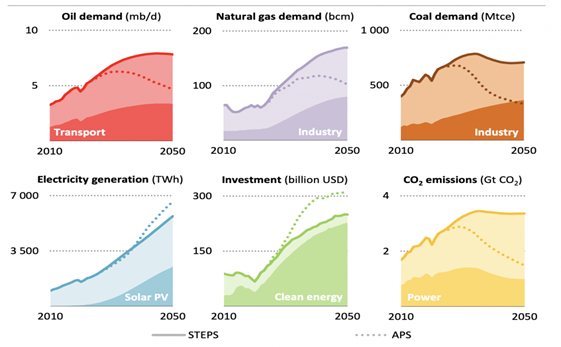

31st October 2023 (7 Topics)
Context:
Recently, the World Energy Outlook report 2023 has been released by the International Energy Agency (IEA).
Key Highlights of the Report:
- Emissions and Temperature Projection: The latest World Energy Outlook predicts a 4-degree Celsius temperature increase due to current policies.
- It aligns with the Intergovernmental Panel on Climate Change's concerns over a 2-degree Celsius rise.
- Peak in Fossil Fuel Demand: A significant revelation is the projected peak in fossil fuel demand by the end of the decade.
- This encompasses coal, oil (due to electric vehicle growth), and natural gas, challenging previous industry projections.
- Diverse Investment Needs: The IEA underscores the necessity for diversified energy investments, estimating a requirement of 2 to 4.7 trillion Dollars by 2030.
- Clean energy is presently favored, but the report advises a balanced approach, cautioning against both excessive and insufficient investments in fossil fuels.
- Recommendations:
-
- Urgency in Clean Energy Investment: While applauding global Net-Zero commitments and clean energy strides, the report stresses the need to ramp up investment in emerging markets. Obstacles like financial constraints and project costs must be overcome through robust domestic policies and increased global assistance.
- Balanced Investment Mix: The report advocates a well-rounded investment approach, emphasizing the importance of infrastructure, grid expansion, low-emission fuels, and carbon capture technologies.
- It highlights regional challenges, including financial health, capital costs, and public acceptance.
- Energy and Mineral Security Considerations: As the energy sector transforms, potential supply concentration and mineral shortages pose security concerns.
- The IEA suggests increased investment in mining, acknowledging associated environmental, social, and geopolitical risks.
Significance of the Report:
- Geopolitical Importance in Energy Management: The IEA underscores the significance of political and commercial ties in energy supply and demand. Strong global energy markets and strategic reserves mitigate risks from geopolitical disruptions and severe weather events.

Way forward:
- Shifting Energy Sources and Geopolitics: Transitioning to cleaner energy sources reduces reliance on fossil fuels controlled by groups like OPEC. While they may still play a role in energy supply, their overall influence diminishes as consumers have more clean energy alternatives.
- India's Energy Transformation: The report applauds India's progress in power generation, clean cooking, and petroleum refining.
- However, it raises concerns about the surge in air conditioner ownership, which strains electricity demand. Additionally, India's solar PV module manufacturing needs to match the growth in solar capacity.
- The IEA proposes ambitious goals for renewable capacity, energy efficiency, methane reduction, clean energy investment, and fossil fuel decline.
More Articles


